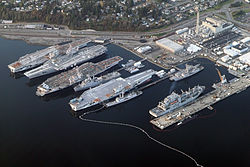Bremerton Navy Yard
|
Puget Sound Naval Shipyard
|
|

Four decommissioned aircraft carriers docked at the shipyard. From left: Independence, Kitty Hawk, Constellation, and Ranger.
|
|
| Location | N shore of Sinclair Inlet, Bremerton, WA |
|---|---|
| Coordinates | 47°33′31″N 122°38′39″W / 47.5585°N 122.6442°WCoordinates: 47°33′31″N 122°38′39″W / 47.5585°N 122.6442°W |
| Architect | US Navy |
| NRHP reference # | 92001883 |
| Significant dates | |
| Added to NRHP | 27 August 1992 |
| Designated NHLD | 27 August 1992 |
| Puget Sound Naval Shipyard and Intermediate Maintenance Facility | |
|---|---|
| Puget Sound, Washington | |
| Type | Shipyard |
| Site information | |
| Controlled by | United States Navy |
| Site history | |
| Built | 1891 |
| In use | 1891–present |
Puget Sound Naval Shipyard and Intermediate Maintenance Facility (PSNS & IMF) is a United States Navy shipyard covering 179 acres (0.7 km²) on Puget Sound at Bremerton, Washington in uninterrupted use since its establishment in 1891; it has also been known as Navy Yard Puget Sound, Bremerton Navy Yard, and Puget Sound Naval Shipyard.
It is bordered on the south by Sinclair Inlet, on the west by the Bremerton Annex of Naval Base Kitsap, and on the north and east by the city of Bremerton, Washington. It is the Pacific Northwest's largest naval shore facility and one of Washington state's largest industrial installations. PSNS & IMF provides the Navy with maintenance, modernization, and technical and logistics support.
Puget Sound Naval Shipyard was established in 1891 as a Naval Station and was designated Navy Yard Puget Sound in 1901. During World War I, the Navy Yard constructed ships, including 25 subchasers, seven submarines, two minesweepers, seven seagoing tugs, and two ammunition ships, as well as 1,700 small boats. During World War II, the shipyard's primary effort was the repair of battle damage to ships of the U.S. fleet and those of its allies.
Following World War II, Navy Yard Puget Sound was designated Puget Sound Naval Shipyard. It engaged in an extensive program of modernizing carriers, including converting conventional flight decks to angle decks. During the Korean War, the shipyard was engaged in the activation of ships. In the late 1950s, it entered an era of new construction with the building of a new class of guided missile frigates. In 1965, USS Sculpin (SSN 590) became the first nuclear-powered submarine to be maintained at PSNS. The shipyard was designated a National Historic Landmark in 1992. The historic district includes 22 contributing buildings and 42 contributing structures, as well as 49 non-contributing buildings, structures, and objects.
...
Wikipedia

